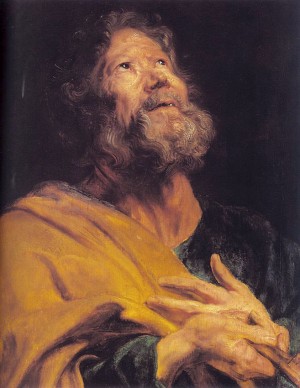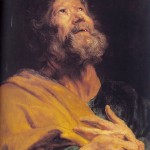In Matthew 16, Jesus asks His disciples who they thought He was. It was Peter who answered that Jesus was the Christ, the Son of the living God (Matt 16:16). As a result, Jesus said this:
I also say to you that you are Peter, and on this rock I will build My church (Matt 16:18).
Of course, in the very next paragraph, Jesus was calling Peter “Satan” and telling Peter that he knew nothing about why Jesus had come or what He was doing (Matt 16:23).
I think that this little exchange in Matthew 16 perfectly describes the history of the church.
The church is like Peter. We know who Jesus is, but we haven’t a clue about why He’s come.
We think Jesus has come to rule the world. To dominate. To control. To manage people’s sin. To stop people from disobeying God. To set those of us who follow Him up as rulers over others.
And when we begin to talk and act like this, we ignore Jesus telling us that although we know who He is, we are listening to Satan regarding what Jesus wants to do in this world.
But I am hopeful.
I am seeing great changes in the church today.
We are beginning to awaken to the reality of why Jesus came and what Jesus stood for.
We are beginning to see what Peter eventually saw.
In a way, Peter’s life is a prophetic summary of the history of the church.

The Calling of Peter
The calling of Peter to be a follower of Jesus is similar to the birth of the church in Acts 2. The church is born and sets out with gusto and bravery to follow Jesus wherever He leads.
In these early years, the church sometimes says and does some dumb things, but we don’t let this stop us from loving Jesus. While we might stick our foot in our mouth, we keep our feet on the path of following Jesus.
The Confession of Peter
Peter is the one who first publicly stated that Jesus was the Messiah, the Son of God.
This seems parallel to the early creeds and confessions that were developed by the church. As the church grew and expanded, they wrestled with the question about who Jesus truly was. They debated about whether Jesus was fully God and fully man.
Eventually, we ended up with the Apostle’s Creed, the Nicene Creed, and the Chalcedonian Creed all set down what the church believed about the identity and nature of Jesus Christ.
The Craving of Peter
Almost immediately after Peter makes his confession in Matthew 16 about the identity of Jesus, Peter reveals that he doesn’t have a clue about why Jesus came to be the Messiah. He thinks Jesus came to rule and reign over the entire world with strength, power, glory, riches, and might. Peter wasn’t alone in this, of course. This is what every Jewish person expected of the Messiah. Peter craved power, and he saw Jesus as the ticket to the power.
And so it is interesting that almost at the exact same time the church was debating about the identity and nature of Jesus Christ, they were also consolidating their power in the world.
After the conversion of Constantine, the church leaders saw that using the power of the Roman Empire and the threat of the sword would help them gain glory, riches, honor, prestige, land, and wealth. To their credit (like Peter), they believed that such things would help them spread the Gospel of Jesus Christ.
But it didn’t. And it hasn’t. Such things only hindered the gospel. This was especially true when the church started using violence to advance their cause.
The Violent Cause of Peter
Peter is the one who struck out violently to defend Jesus when He was arrested in the Garden of Gethsemane. He took off the ear of Malchus, the servant to the High Priest. I believe Peter was actually trying to take off his head…
Why did Peter do this? Because he wanted to protect Jesus. He wanted to defend the honor of Jesus. He was also looking out for his own cause, that he had invested three years of his life into. That he had abandoned his lucrative fishing business for. He had forsaken all to follow Jesus, and if Jesus got arrested and condemned, all the work and sacrifice would be for nothing.
It has been the same with the church. We work. We labor. We invest. We serve. We tithe. We build. We follow. We sacrifice.
And we want it to pay off.
And we are willing to exhort to violence if necessary.
It is a clear fact that most of the violence carried out in Europe and the Middle East from about 400 AD to 1900 AD was violence done in the name of Jesus. It was violence to “defend Jesus” and they carry the gospel to the heathens. Like Peter swinging his sword at Malchus, we swung the sword at heathens in the North, and Muslims in the East, and Jews in Jerusalem.
Frequently, we also swung the sword at each other, because “they” did not follow Jesus or believe the same thing about Jesus as “we.”
The Cursing of Peter
When Jesus was finally arrested and brought to trial, Peter followed Him. But when challenged and questioned about whether he was a follower of Jesus, Peter ended up denying Jesus and cursing Him.
 This is exactly what the church has done as we have carried the Gospel and spread the name of Jesus with violent and greedy methods. In seeking to spread the name of Jesus with the use of money, power, domination, control, manipulation, and the sword, we have only ended up cursing and denying Jesus, and have led many other people to do the same.
This is exactly what the church has done as we have carried the Gospel and spread the name of Jesus with violent and greedy methods. In seeking to spread the name of Jesus with the use of money, power, domination, control, manipulation, and the sword, we have only ended up cursing and denying Jesus, and have led many other people to do the same.
Today, when most people reject Jesus, they are not rejecting Him as He truly is, but are instead rejecting and denying the Jesus which the church has presented to them. The Jesus who builds monstrous buildings on the backs of the poor. The Jesus who looks out for the rich and the powerful. The Jesus who kills others in the name of power. The Jesus who doesn’t forgive. The Jesus of rules, regulations, and rituals.
When we present Jesus this way to the world, we are saying, with Peter, “No, I never knew Him.”
The Contrition of Peter
After the cock crowed, Peter realized what he had done, and went into mourning. I believe that while Jesus died on the cross, and was buried in a tomb, and stayed in the grave for three days, Peter was repenting and wailing and crying about what he had done.
 The church is beginning to do this over the past ten to twenty years.
The church is beginning to do this over the past ten to twenty years.
We have begun to awaken to the fact of how we were complicit in much of the violence of this world. How we have contributed to the abuse of the poor, the neglect of children and women, the trampling of nature, and the overall condition of the world today.
I believe that many churches in the West have not yet come to his realization, but I see signs every day that more and more people are doing so.
The Conversion of Peter
Acts 2 reveals a completely different Peter. He has awakened to a new reality, and a new understanding of Jesus. He not only understands who Jesus is, but He now understands why Jesus came: Not to rule, but to serve. Not to live, but to die. Not to be powerful, but to be powerless.
For Peter, Jesus turned the world upside down, and once Peter aligned Himself to Jesus, he began, for the first time, to see the world right side up.
And as Christians around the world awaken to the reality of how we have maligned the gospel and blasphemed the name of Jesus by using Him to defend our violent causes, we too are beginning to see our place in the world. We are beginning to see that we are here, not to rule, but to serve. Not to live, but to die. Not to be powerful, but powerless.




It’s frustrating to look out a window and point a finger only to realize it’s a mirror. Thank you for the perspective.
The story of Peter and the Lord always make me cry! You moved me! I agree with you that, as a the church, we are awakening to understanding why Jesus came, as Peter did… amazing as always dear Jeremy!
Interesting comparison. Unfortunately, many churches are still following false beliefs.
Christianity is/was a _global_ phenomena.
The New Testament sets up a distortion of the spread of Christianity, by focusing only on its advance into the Roman Empire, almost completely ignoring its advances into Africa, the Parthian Empire, India, and points east.
(The evidence, whilst extremely flimsy, suggests that the Gospel message was in Beijing by AD 60, and Kyoto by AD 70. Going south, it was in Zanzibar by AD 40, and Timbuktu by AD 50. Going west, it was in Britain by AD 40. The evidence supporting the claim that Christianity was in South America by AD 50 is, at best, too flimsy to be deemed even suggestive, much less quasi-reliable.)
Between 200 AD and 1500 AD, the only violence in the Middle East, that was done in the name of Jesus, was done at the behest of Catholic Christianity. The indigenous Christianity worked within the political system, to the extent that doing so was not a violation of God’s law.
In 1000 AD there were as many Christians east of the Ganges river, as were within the former Parthian Empire. There were fewer Christians in Europe, than either east of the Ganges river, or in the former Parthian Empire.
By choosing political power, and economic power, over the Gospel Message, Catholic Christianity survived, whereas Eastern Christianity was persecuted into non-existence.
The other major difference between these two branches of Christianity, can be seen in the translation of the Buddhist Canon into Chinese. It was done by Christians, not Buddhists.
We need a spiritual revelation of understanding of who our JESUS Christ is. Because through our natural and intelligent ( blood and flesh) understanding we will impose JESUS Christ on ourselves and others. BUT through the spiritual revelation of the word , JESUS who is GOD HIMSELF will revel Himself to us.
I not clear on why you used Matthew 16:18 in the beginning of this .
You seem to suggest that Jesus’ statement was a complement to Peter.
Clearly in that verse there are two forms of the word ‘rock’ — Peter is called, “Petros”,
and Jesus calls Himself (preceded by the definite article) “He Petra” — “The Rock”.
That’s a small rock, Peter and a big Rock, Jesus.
Certainly no one less than God could carry the weight of God’s church upon his back; thus Jesus referred to Peter as well as Himself in that verse.
The ancient debate is what exactly Jesus was referring to when He used the word “Rock.”
The Catholic church believes Jesus was referring to Peter.
You have stated a second view, that Jesus Himself is the Rock.
A third view (my view) is that Jesus was referring to Peter’s confession: “You are the Christ.” It is on this confession that the church is founded and built.
I have no hesitation to declare that the pope is not the Vicar of Christ, which makes less sense when we consider “history” and the Catholic church.
And, yes, the confession is part of the context of the passage — “The Rock”, which is obviously Jesus, added to the initial declaration by the Spirit through Peter. I see no conflict here. Obviously the Catholic disagrees with me.
@tovlogos Hi, I’m Roman Catholic…I’ll spare you the time guessing what I believe because I think you’ll need a lot more time to quote where in the New Testament does Jesus says he’s the bigger rock. Second, Jesus is validating that the “heavenly Father” has revealed himself to Peter. Therefore, at that moment Jesus has every right to say the keys of heaven are yours and nothing evil can go in. Whatever you bind in heaven will be bound on earth… so at this point Jesus is now clearing things up for Peter the same way I’m clearing things up for you (I hope). You stated no one less than God can carry the weight of God’s church on our shoulders. Again you couldn’t be anymore confused. Roman Catholics in COMMUNION with Christ make up the church (any person who professes faith in God and MARY!) Many Roman Catholics have carried God’s message to the end (we are all called to be saints and those that have guts martyrs). In communion with Jesus you can move mountains, cure the sick, raise the living, cast out demons. This should make it clearer for a protestant…Each and everyone of us are called by the “heavenly Father” to LOVE God and Love your neighbor…you do that my Protestant brother and you will also take advantage of God’s blessing/promise that you will also have the keys to get into heaven.
Please don’t waste your time posting translations of scripture without it being in proper context. Either way I love clearing things up having to do with God.
@ Jeremy Myers… I loved your . The church’s view of this verse and your view is the same Peter professing/ confessing his faith is the why Christ still exists. If the Roman Catholic church ceased to profess faith in Christ and his mission what we will get would be the scolding Peter got when he began to think about ruining God’s plan (the passion) “Get behind me Satan! You are an obstacle to me. You are thinking not as God does, but as human beings do.” So as long as Peter (Roman Catholic’s first pope and all the future popes for that matter) professes faith in Jesus Christ as God’s son whatever the pope says is bound, believe Jesus Christ, it will be bounded in heaven…hey I don’t like all the mistakes that happen in church but as one person said (point out the window and realize you’re pointing to a mirror….I don’t like some of the things I do.
Thanks you, Bryant,
We will agree to disagree — I spent a long time discussing such things with Catholics. I don’t do it any more, which is why I wrote a short post.
However, I won’t leave you without a response, because I care about you as much as I care about all human beings who are trying to enter God’s kingdom.
So much has been written about Roman Catholicism — there are reams of exegetical documents that certify that Catholicism has all the ear marks of the Cult. Yet obviously spin their theology in a way that seems right to them.
Mike Gendron is much more up my alley. He has done a lot of work on the matter, so I defer to him:
http://www.reachingcatholics.org/deceived.html
I would insert something about the transfiguration where Peter immediately want to build an house for the Lord and others…
Like the comparision, will not defend it 🙂 but has a ring to it…
Down through the centuries since Jesus walked this earth many have supposed that power, wealth, and even violence best advance the cause of Christ. Strange, isn’t it, that there is no record that Jesus ever modeled or advocated methods such as those, methods which in reality better serve the causes of those who use them, rather than the cause of Christ? Instead of such methods, Jesus instructed his followers to love God with their entire being and their neighbors as themselves.
Do we follow Jesus and employ what he modeled and told his followers to do, or do we suppose that we should use political systems and other human systems commonly used to advance and defend our causes? Does God need us to defend the church, the Bible, our “theology” and all that we suppose Christianity must and should stand for? Or might we do better to allow God to defend his causes, his church, while we follow Jesus’ directive to love God and neighbor?
Whom do you suppose stands farthest from God? The murderer? The addict? The adulterer? The prostitute? The atheist? The _____? – We know him or one of his kind. We sit with him. We talk with him. We touch him. We hug him. We show love to him, hopefully the love of Jesus. When it is the love of Jesus, he hears. All else is a clanging cymbal in his ears. Only the love of Jesus has a chance of penetrating his heart.
I find that most of the violence done in the name of Jesus here in America consists of verbal trashing, demonizing, gossiping, proof-texting, and condemning. Speaking the truth in love is not practiced nearly enough by those of us in the church.
Jesus called the religious leaders out for their hypocrisy, and I believe that we need prophetic voices in our time who will help keep the church honest about its sins of violence toward one another and those outside our faith.
I think its wrong to say Apostle Peter’s betrayal is like the church through the centuries that is just now realizing its wrongs. I see that you believe that the Catholic church and the Church of England were part of the 1st century church of Christ, rather than an off shoot of it, that gained power and tried to kill (murder) those who did not agree with it. In deed, many members of the church of Christ who believed the first century church/ biblical writings (and yes there were copies, of letters found in the second century) were called heretics, witches and burned at the stake, for debating with the Catholics on original sin, baptism (full immersion only) for believers only and never forced baptism, individual church autonomy, objection to the teaching of transubstantiation, amongst other things. Please read Traces of the Kingdom by Keith Sisman. This outspoken christian man recently died of a massive heart attack in his country of England. Hmm. Be ready for your eyes to be opened.
Dear Jeremy Myers: This article includes this: “Eventually, we ended up with the Apostle’s Creed, the Nicene Creed, and the Chalcedonian Creed all set down what the church believed about the identity and nature of Jesus Christ.” The Chalcedonian Creed was officially adopted by a church council in 451 A.D. But what church was it that officially adopted the Chalcedonian Creed? Was it the church founded by Jesus Christ and depicted and described in the New Testament under the inspiration of the Holy Spirit, or was it the Catholic Church? I believe that the answer is: it was the Catholic Church. It was the Catholic Church that held a council in 451 A.D. and officially adopted the Chalcedonian Creed and used the Roman State to enforce the Chalcedonian Creed on everyone it could. The church that proclaimed the Chalcedonian Creed in 451 A.D. also practiced the baptism on nonbelievers (infants), prayed to Mary, and believed in and conducted the “sacrifice of the Mass,” and had a special order of priests in the church to carry out the “sacrifice of the Mass.” All these things continue today in the Roman Catholic Church and in the the Russian Orthodox Church (and the other “Eastern Orthodox” churches). Since the Catholic Church in 451 A.D. had so grossly departed from the Biblical faith, why do you respect, receive and follow the Chalcedonian Creed, as if it were written by the Apostles and included in the New Testament? Jeremy Myers, are you going to be like former “Bible Answer Man” Hank Hannegraaf and become a Greek Orthodox believer and start attending the “sacrifice of the Mass” conducted by Greek Orthodox priests and start praying to the Virgin Mary? My point is that I am always flumoxed and dismayed about the seeming “schizophrenia” of most Evangelicals and Protestants: they reject Catholicism of the present time, but strangely accept Catholicism as it was from about 200 A.D. until about 700 A.D. The problem with that is that the Catholicism of 200 A.D. to 700 A.D. already contained almost all of the unbiblical teachings and practices that are present in the present-day Roman Catholic Church and the present-day Russian Orthodox and Greek Orthodox churches. My problem is that I am looking for teachers and a fellowship that teaches and lives out the true way of Christ. How can that be found in the present time? If some one cites as authoritative the council held by the Catholic Church in 451 A.D., why wouldn’t he also cite as authoritiative the council held by the Catholic Church from 1961-65 (called the Second Vatican Council)? The issues addressed by the Council of Nicea and the Council of Chalcedon never even arose among the Apostles and other believers of the New Testament times. Why can’t the Holy-Spirit produced and guaranteed Scriptues be sufficient? Why must we look to the Catholic Church for any guidance whatsoever? My real question is: Why didn’t the church of New Testament times persist and continue? Why did it disappear, being replaced by the Catholic Church for over a thousand y ears, then begin to reappear with the Waldenses, the Protestants, and the Anabaptists? How could Jesus Christ allow his church to disappear for over 1,000 years? And now, after the chain of continuity going back to the apostles has been broken, how on earth can anyone identify those following the true Way approved by Jesus Christ, with so many aggressive false teachers claiming to be approved by Christ and holding and gaining such incredible fame and power?
I am not quite sure what you are asking. I think the church has always existed since it was birthed in Acts 2. It never disappeared.
The difficulty with the church, aka, the body of christ is it cannot be seen. No one knows its members. No matter how an individual professes or acts. This is how it should be. No high office exists within its structure. We are all equal as the day we where born. So to those who hold to ways other than the actual true way that is jesus christ as professed by himself. Good luck with that. All them ism,s and ist,s will do you fine. This is the day the Lord has made. Rejoice and be glad in it! Start each day as if you,d never heard the word church and only the name jesus. Keep it simples! And be thankful for small mercy’s. There is no judgement for either Catholic or Protestant ways or traditions that has not already taken place 2019 years ago on a cross. Amen.